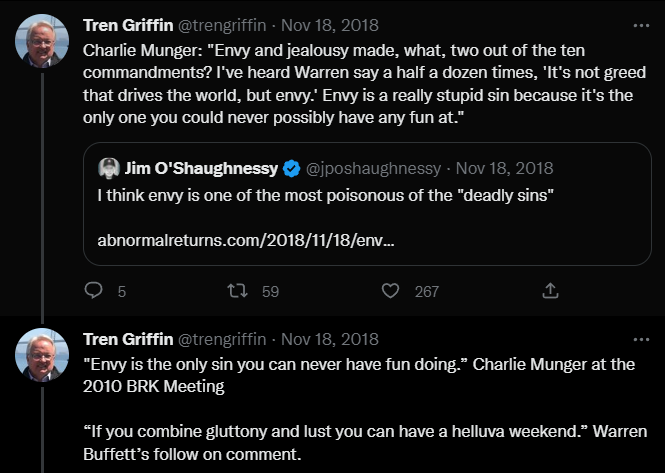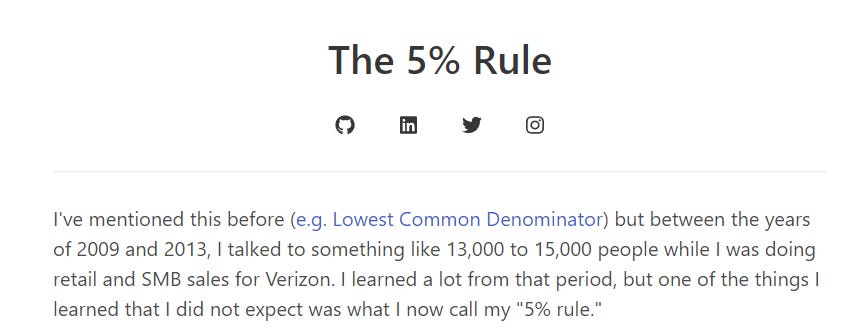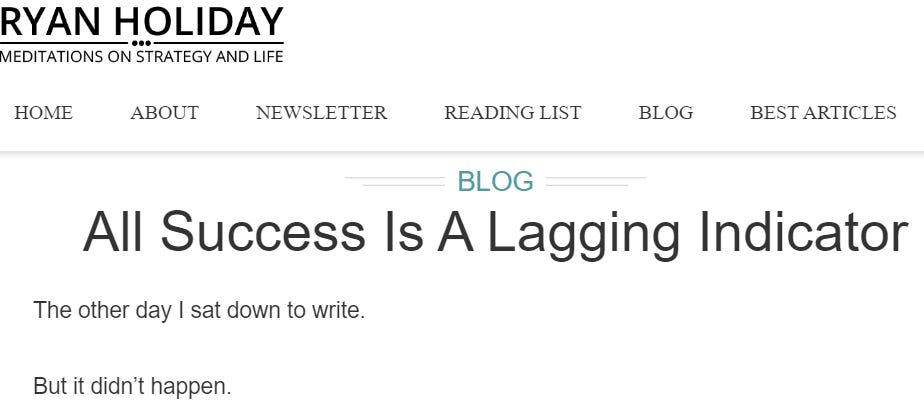M&Ms: Envy
Trying to avoid envy in the 87th edition.
Hey Team,
Ironically, something that's helped me mostly* avoid envy has been my drive to rise up from poverty.
For as long as I can remember, my sole focus has been on getting more of what I need. With more of what I need, I can run as far as possible from that monster called poverty that always chases you when you've had your run-in with it.
It helps avoid envy because when you've got nothing, every little bit you get is a massive improvement over nothing.
"Take some more tea," the March Hare said to Alice, very earnestly.
"I've had nothing yet," Alice replied in an offended tone, "so I can't take more.”
"You mean you can't take LESS," said the Hatter, "it's very easy to take MORE than nothing.”
-From Lewis Carroll's Alice's Adventures in Wonderland.
But something odd is happening in our society. Many see that others might have achieved more or acquired more worldly goods than them and are envious and unhappy.
Envy turns out to be a force so powerful that two of the ten Bible commandments try to address it. And yet few people talk about it openly. Charlie Munger calls out the peculiar case of psychology books that all seem to avoid talking about jealousy and envy in his Psychology of Human Misjudgment. But jealousy and envy impact many of our relationships, including with our peers, bosses, and employees. With our colleagues and acquaintances, even with our family members.
I commend Moiz** for talking about envy openly and asking the question recently when most won't.
Although the answers people gave him, I think, are no good, they range from thinking badly about your neighbor not to envy them. Or take mushrooms or other hard chemical drugs to alter your mind permanently in order to not envy.
But envy is so powerful that Warren Buffet and Charlie Munger think it drives the whole world. Here Charlie Munger, in his own words, talking about envy:
The world is not driven by greed; it's driven by envy.
The fact that everybody is five times better off today than we used to be, they take that for granted. All they think about is the fact somebody else has more now, and it's not fair that he should have it, and they don't. That's the reason God came down and told Moses that he couldn't envy his neighbor's wife or even his donkey. I mean, even the old Jews were having trouble with envy. It's built into the nature of things.
It's weird for somebody my age because I came up in the middle of the great depression. And the hardship was unbelievable. And yet I was safer walking around Omaha in the evening than I am in my own neighborhood in Los Angeles today after all this great wealth and so forth.
I have no way of doing anything about it. I can't change the fact that a lot of people are very unhappy and feel very abused after everything has improved by about 600% because there is still somebody else who has more.
I have conquered envy in my own life. I don't envy anybody. I don't give a damn what somebody else has. But other people are driven crazy by it.
But fortunately for us, unlike Psychology, philosophy has a lot to say about envy.
René Girard, a modern-day philosopher, came up with a theory called mimesis. At the most basic level, it says that we all mimic and copy from each other in various ways, including copying each other's desires. At first, this is good; this is how we learn. But then, if we are not careful, it can evolve into mimetic rivalry. Envy.
David Perell and Johnathan Bi have a wonderful seven-part series on René Girard and his philosophy. And lecture three of the series is about mimetic rivalry and gives us an incredible glimpse of how bad envying your neighbor can become. In this lecture, we learn that the Greeks were shifting to a market society around the time of Plato. And many new people were becoming wealthy in Greece. The aristocracy, the old wealthy, didn't like this one bit. So they shunned money and wealth for honor instead. This is how the Greeks evolved into an honor society, something the newly wealthy couldn't easily acquire. All of this happened because the aristocracy envied what many citizens were achieving in the markets.
We also learn that Girard has qualified Mimetic Desire into two types: physical and metaphysical. The physical desire theory is wanting things because of what they can do for us in the physical world. We want a car because it can get us somewhere faster than walking. But some want a car because of the status it can confer on them, not because they’ll enjoy it or it for physical properties; this is the metaphysical desire theory.
Think about someone who wants a bigger house than their colleague, or neighbor, not because they need a bigger roof over their head but because they need to show off. They might think a huge home, bigger than their neighbors, will confer some status on them. This is the metaphysical desire of mimesis, and this what I believe drives envy. This is vastly different from someone who acquires say a two-family home because it can give them a roof and help them generate some income. That person wants the property for what it can do for them, roof and income so they can have freedom, not the status it will confer.
In my opinion, it is in attempting to want things for their physical properties rather than metaphysical ones that we can see a path to avoiding envy.
If we can go after things for what they can do for us in the physical world, then we are unlikely to engage in some mimetic rivalry and envy someone else who has a bigger house for status or to Keep Up With The Joneses.
Not getting caught up in envy and instead focusing on what we need is how we will get ahead in 2023—happy new year.
* I say I mostly avoided envy because I am not perfect. But I think the better I get at this, the further I will get on my path, the happier I will be, and the better and more meaningful life I will lead. And writing about it for me is, for sure, a way to keep myself in the right direction.
** Link to Moiz Ali’s honest question.
Two Articles: The 5% rule, Success is a Lagging Indicator
I loved this article by Jon Paul Uritis because it confirms something I have observed myself in the wild.
I observed it when I was a waiter in a restaurant for a decade and I observed regularly now in my interactions on social media.
While I don’t necessarily think all success is a lagging indicator, I do agree that fortune favors the prepared mind.
This essay by Ryan is pretty good.
Two Memes: Fun of real estate, Infinite
A fun thread full of memes making fun of real estate companies.
Speaking of the field of Psychology.
A short update from me:
I managed to cap off 2022 by finishing and launching my book on real estate investing for beginners.
I was invited to talk to the small bets community about four times last year on this topic. The community does great talks from members with hard earned experience all the time. Each time I did my talk there were questions and feedback from the community, which helped strengthen my ideas.
Those talks made me realize I had enough content for a book. While I don't think it will be a number-one seller, given the topic, it feels great to have my hard-earned lessons out there. As a small bet, my hope is that it helps someone. And helps me establish some credibility on something I plan to do in perpetuity: continue investing in real estate part-time.
I’ve been a big believer for a long time that more people in tech should diversify out of bits into atoms. From software to real estate.
As always, thank you for reading.
-Louie
P.S. you can reply to this email; it will get to me, and I will read it even if I cant always reply to all of them.









This is such an important topic but unfortunately, many people just avoid talking about this.
IMO, Focusing on the present moment always helps me to let go of negative emotions and rumination about what others have or have achieved in past.
I always reframe my thoughts; Instead of focusing on what someone else has that I don't, I try to reframe my thoughts to be grateful for what I do have.
I always find ways to celebrate others' successes; especially with whom I hangout out with either offline or online because Instead of feeling envious of others' accomplishments, I try to find ways to genuinely celebrate their successes. This always helps me to shift my focus from my own desires(only me stereotypes mindset) to a more positive and supportive mindset.
And I think having a hobby or activity that brings you joy e.g. GYM for me and playing with my kid; Engaging in activities that bring joy and fulfilment helps to reduce feelings of envy, as it gives me a sense of purpose and helps me to feel more fulfilled.
Love today's letter, Louie, Keep sharing your thoughts with us. And Good luck with the new book.
This is a good take on envy. I often feel that the metaphysical based envy is hard to handle. The physical less so. If I watch people in my Facebook-feed travelling to Spain I fell envious. But if I watch my schedule, check my account. That is, forcing myself down to earth, considering the more concrete choices. Then I don't fell the envy anymore. The trick is to be pragmatic and avoid the meta-thoughts. Keep up the speed in real life. Make sure to challenge your self and stay in the Never ending Now.